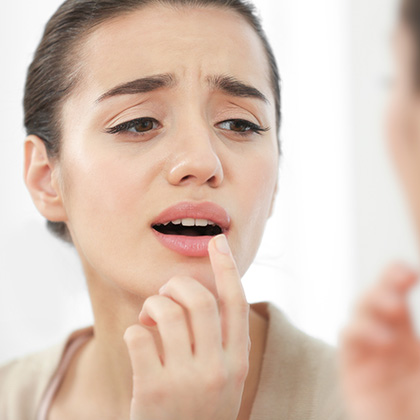
What is glossitis?
You probably don’t give much thought to your tongue, but it’s important for several essential functions including tasting, chewing, swallowing and talking. However, if your tongue becomes swollen and inflamed, the condition is called glossitis.
Glossitis can be acute or chronic:
-
Acute glossitis is when your tongue becomes inflamed suddenly and, often, severely (as the result of an allergic reaction, for instance)
-
Chronic glossitis is when you experience inflammation of the tongue on a regular basis, typically as a symptom of another health condition
As well as inflammation, glossitis can cause changes to the tongue’s texture, making the upper side of it red, shiny and smooth (this happens when the small bumps on the surface – the lingual papillae – shrink). In this instance the condition is often called atrophic glossitis (or alternatively Hunter glossitis or Moeller glossitis).

With atrophic glossitis the tongue can be tender and painful, and there may also be burning or itching sensation. Other symptoms can include difficulty swallowing and problems with speaking or eating.
What causes it?
Several things can cause glossitis, including:
Allergies
A severe allergic reaction – called anaphylaxis – can make your tongue swell suddenly. Common things that can cause anaphylaxis include certain foods, medicines and other irritants such as bee or wasp stings. Anaphylaxis is a medical emergency – if it happens to you or someone you’re with, call 999 for an ambulance immediately (find out more about this type of allergy by reading our anaphylaxis guide). Milder allergies can make your tongue swell too, including allergies to ingredients found in toothpaste and mouthwash.
Some foods can also cause glossitis, even if they don’t cause allergies, including spicy foods and very hot foods (that is, hot in terms of physical heat). Even things like tobacco and alcohol may irritate the tongue and cause swelling in some people.
Mouth injuries
Burning or cutting your tongue can cause inflammation, as can wearing dental appliances such as braces.
Infections
Infections caused by bacteria, viruses, yeasts and fungi can all cause glossitis, including oral herpes (or herpes simplex, the viral infection that also causes cold sores and blisters around the mouth) and Candida (an overgrowth of the yeast C albicans).
Nutritional deficiencies
One of the most common nutritional deficiencies linked to glossitis is a lack of iron (this can also cause anaemia). That’s because if you don’t have much iron in your blood, you will usually have low levels of a red blood cell protein called myoglobin – this is important for your muscles, including your tongue’s muscle tissue. Pernicious anaemia, an autoimmune condition that can lead to vitamin B12 deficiency, can also cause glossitis (up to 25 per cent of people with vitamin B12 deficiency anaemia may also have glossitis (i)).
Medical conditions
Several other conditions can cause glossitis because they cause malnutrition or problems with nutrient absorption, including Crohn’s disease and coeliac disease. Meanwhile conditions that affect the immune system – such as Sjögren’s syndrome – can cause changes in the mouth that lead to inflammation of the tongue.
If you have a swollen tongue, see your GP or dentist without delay as it can be a symptom of something serious such as tongue cancer, leukaemia or an overactive thyroid
Geographic tongue
Besides atrophic glossitis there are other types of glossitis, including geographic tongue (also known as benign migratory glossitis or erythema migrans). This condition gets its name from the fact that it causes irregular, smooth, red patches with white or light coloured borders that look like a map on the upper and side surfaces of the tongue – though you can get it on the under surface of your tongue too, as well as on the inside of your cheeks or on the roof of your mouth.
These patches – which heal by themselves in time – can vary in size. But as the old patches heal, new ones can form, which can often make it look as if the patches are actually moving around, often rapidly.
According to the Oral Health Foundation, geographic tongue is a common condition that affects all age groups and can run in families (which means it may have something to do with your genes) (ii). It’s also thought to be more common in people who have psoriasis as well as those who have a condition called fissured tongue, where cracks and grooves appear on the top and sides of the tongue (iii).
What causes geographic tongue?
Oral Health Foundation experts claim geographic tongue is a result of the way the surface of the tongue replaces itself. The top layer of the tongue should replace itself evenly, but with geographic tongue it doesn’t, and parts of the top layer come away too early, leaving a red, sore area. These red areas of skin are thin and can become infected with Candida. Meanwhile other areas of the top layer that don’t come away too early can remain for too long.
The good news, however, is that geographic tongue is harmless and not contagious. But it can cause discomfort and a painful, burning sensation, especially when you eat hot and spicy foods – especially chillies – or acidic foods such as citrus fruit. Cigarette smoke and toothpaste with additives, whitening agents or flavouring can also irritate geographic tongue.
How long does geographic tongue last?
Nobody really knows what causes geographic tongue, but it’s thought to last in some people for up to a year. There’s no specific treatment for it, but if you have geographic tongue you can learn to manage it to some extent by avoiding foods that make it worse.
Other types of glossitis
Rhomboid glossitis
Another type of glossitis is median rhomboid glossitis. This is caused by a Candida infection, and appears as a red, smooth or thickened patch in the centre of the upper side of the tongue. With this type of glossitis you can get a sore mouth, and there may be red and white spots or patches in your mouth too.
Candida normally lives in the mouth without causing any harm. But under certain conditions it can cause problems. For instance, if any of the following apply to you, you have a higher risk of developing median rhomboid glossitis:
-
You smoke
-
You have a lot of sugar in your diet
-
You’re taking certain antibiotics, using steroids (including inhaled steroids) or having chemotherapy treatment
-
You wear dentures (especially if you don’t take them out at night)
-
You have uncontrolled diabetes or a weakened immune system
-
You have a persistent problem with dryness in your mouth
-
You have low levels of iron or vitamin B12
Herpetic geometric glossitis
Other types of glossitis include geometric glossitis – also called herpetic geometric glossitis – which is caused by the herpes simplex virus and has been found in people with weakened immune systems (iv). Geometric glossitis causes a deep crack in the middle of the tongue and is often quite painful.
Strawberry tongue
Meanwhile, strawberry tongue (sometimes also called raspberry tongue) is a lot like glossitis. It makes your tongue swollen, red and bumpy but it’s not an actual condition itself, rather a symptom of a condition such as scarlet fever, kawasaki disease (which causes inflammation in your arteries), toxic shock syndrome or it can be caused by food or medicine allergies. Strawberry tongue can be a sign of vitamin B12 deficiency.
A sore or painful tongue can also be caused by oral thrush (Candida) or mouth ulcers, which can affect the underside of the tongue.
Glossitis treatment: does glossitis go away?
Glossitis often clears up without treatment, but if you have moderate or severe symptoms your GP or dentist can recommend or prescribe medicines to ease them and make you feel better.
For instance, if you have geographic tongue treatments for thrush can help your tongue feel more comfortable – antifungal gels, for instance, or antifungal mouthwashes. Such antifungal treatments can also help relieve the symptoms of median rhomboid glossitis, though some people may also need a course of antifungal tablets to help reduce the level of Candida in their mouth.
Other treatments include steroid medicines (corticosteroids) to help reduce the inflammation of glossitis, including gels that you apply directly to the surface of your tongue. You may also need to take a course of antibiotics if you have a bacterial infection, or antiviral medicines to clear up a viral infection. Alternatively, your doctor may prescribe dietary supplements if you have glossitis caused by a nutritional deficiency (see below for more details of nutritional supplements).
What can you do?
Meanwhile it’s not always possible to prevent glossitis but there are some things you can do yourself that may help lower your risk.
-
Avoid smoking (read more about giving up)
-
Practise good oral hygiene to improve the health of your teeth, gums and tongue by doing the following:
-
Brush your teeth last thing at night and at least one other time during the day with a fluoride toothpaste (spit out the toothpaste afterwards, don’t rinse)
-
Floss your teeth or clean between them using interdental brushes at least once a day
-
Try cutting down on sugary foods and drinks, and have them just at mealtimes
-
Go for regular dental check-ups, as often as your dentist advises
-
-
Avoid foods that irritate your tongue or mouth, such as spicy or acidic foods and acidic drinks.
-
Try to eat as healthily as possible, which includes having at least five portions of fruit and vegetables every day. Make sure your diet includes foods that provide iron and vitamin B12 to prevent deficiencies:
-
Foods rich in iron include red meat, liver, sardines, clams and mussels, as well as vegetarian foods such as seaweed, nuts, seeds, eggs, dark green leafy vegetables, lentils and fortified cereals (try to have something that contains vitamin C when you’re eating plant-based iron foods to improve absorption – a glass of orange juice, for instance). Copper also helps improve iron absorption: you can find it in cheese, egg yolks, green vegetables, dried figs, seafood and liver.
-
Vitamin B12 is mostly found in foods of animal origin, including meat, fish, eggs and dairy products. If you don’t eat any animal-based foods – if you’re a vegan, for instance – there are only a few sources of B12 available to you, including yeast extract spreads and fortified foods.
-
-
Drink plenty of water to stay hydrated and to keep your mouth from getting too dry (take frequent sips throughout the day if you tend to have a dry mouth).
Nutritional supplements for glossitis
There are two obvious nutritional supplements that help prevent glossitis: iron and vitamin B12. That’s because low levels of these nutrients are widely thought to cause glossitis symptoms. You can get these nutrients from food, but if you’re concerned your diet doesn’t provide much of one or both, taking a supplement may be helpful.
Iron
This mineral is essential for human health. Our bodies use it to make haemoglobin, a protein found in red blood cells that transports oxygen around the body, as well as myoglobin, which delivers oxygen to the muscles. Deficiency is common, however, with around 500 million people thought to be affected by iron deficiency anaemia (v). If you’re a woman in your childbearing years, your risk of having iron deficiency anaemia is higher than normal – in the UK, around 23 per cent of pregnant women are thought to have anaemia, as well as 14 per cent of non-pregnant women (v).
If you’re considering taking an iron supplement, look for one with a good level of iron: according to the NHS men over 18 and women over 50 need 8.7mg a day, while women aged 19 - 50 need 14.8mg a day. The NHS also says taking 17mg or less of iron supplements a day is unlikely to cause any harm (vi).
Vitamin B12
This important B vitamin – which is also called cobalamin or methylcobalamin – is needed for a wide range of functions in the body. However, as with iron, many people have low levels. In the UK, for instance, six per cent of adults under the age of 60 are thought to be affected by vitamin B12 deficiency, and in those who are older this rises to around 20 per cent. Also around 11 per cent of people with vegan diets are thought to be B12 deficient (vii).
NHS experts suggest that adults need around 1.5 micrograms of vitamin B12 every day, but they also say you can take up to 2mg (2,000 micrograms) of vitamin B12 in supplements every day without causing any harm (viii). If you’re interested in taking B12, you can take it as an individual vitamin or as part of a good B complex formulation.
You can also get the iron and B12 you need in one good-quality multivitamin and mineral supplement. Some people find this more convenient than taking single-nutrient supplements – just make sure any multivitamin you take provides the right level of any particular nutrients you may need.
Glossitis can make you feel uncomfortable but there’s lots you can do to ease the symptoms and lower your risk of having it in the first place. Hopefully this guide will offer you the information you need to keep your tongue as healthy as possible. For more advice about keeping your teeth, gums and mouth healthy, take a look at the oral health section of our health library.
References:
-
Stoopler. ET., Kuperstein AS., Glossitis secondary to vitamin B12 deficiency anaemia. CMAJ. 2013 Sep 3;185(12): E582. Available online: https://www.ncbi.nlm.nih.gov/pmc/articles/PMC3761039/
-
Available online: https://www.dentalhealth.org/geographic-tongue
-
Available online: https://www.dentalhealth.org/geographic-tongue
-
Grossman. ME, Stevens. AW, Cohen. PR. Herpetic Geometric Glossitis. N Engl J Med. 1993;329:1859-1860. Available online: https://www.nejm.org/doi/full/10.1056/nejm199312163292506
-
Available online: https://cks.nice.org.uk/topics/anaemia-iron-deficiency/background-information/prevalence/
-
Available online: https://www.nhs.uk/conditions/vitamins-and-minerals/iron/
-
Available online: https://cks.nice.org.uk/topics/anaemia-b12-folate-deficiency/background-information/prevalence/
-
Available online: https://www.nhs.uk/conditions/vitamins-and-minerals/vitamin-b/
Related Posts
Disclaimer: The information presented by Nature's Best is for informational purposes only. It is based on scientific studies (human, animal, or in vitro), clinical experience, or traditional usage as cited in each article. The results reported may not necessarily occur in all individuals. Self-treatment is not recommended for life-threatening conditions that require medical treatment under a doctor's care. For many of the conditions discussed, treatment with prescription or over the counter medication is also available. Consult your doctor, practitioner, and/or pharmacist for any health problem and before using any supplements or before making any changes in prescribed medications.

Christine
Christine Morgan has been a freelance health and wellbeing journalist for almost 20 years, having written for numerous publications including the Daily Mirror, S Magazine, Top Sante, Healthy, Woman & Home, Zest, Allergy, Healthy Times and Pregnancy & Birth; she has also edited several titles such as Women’ Health, Shine’s Real Health & Beauty and All About Health.
View More



